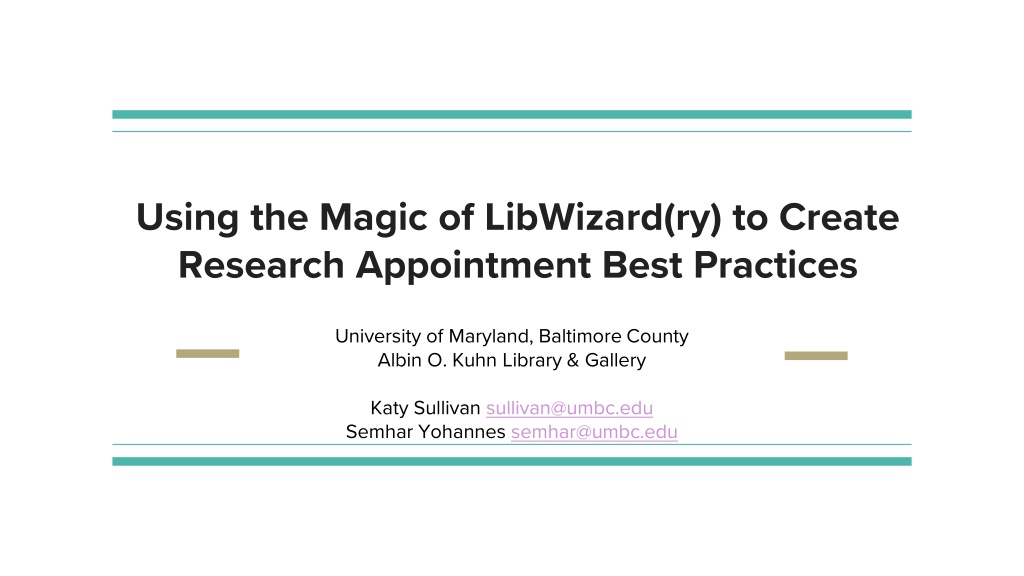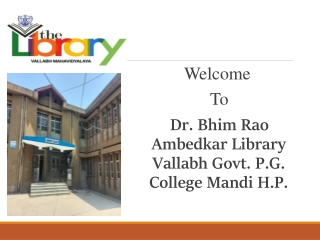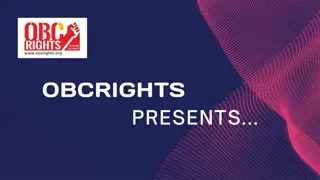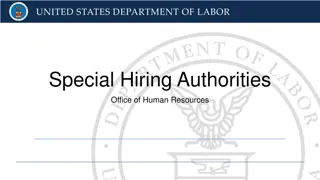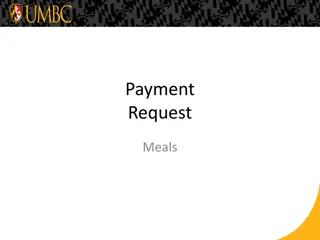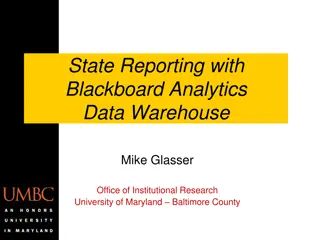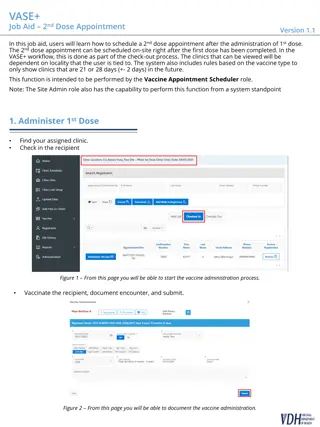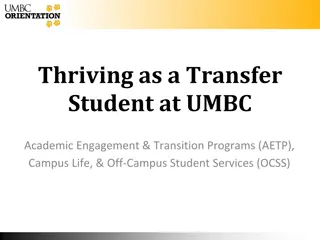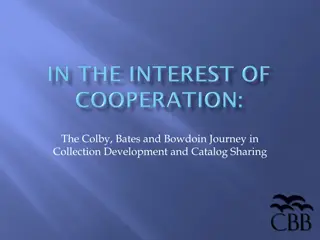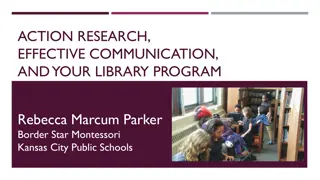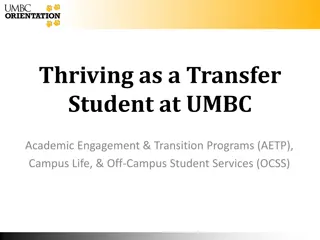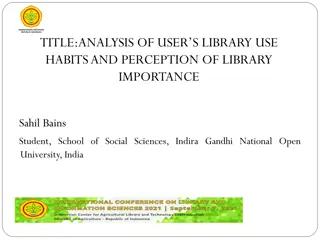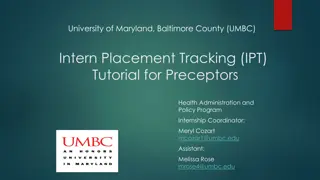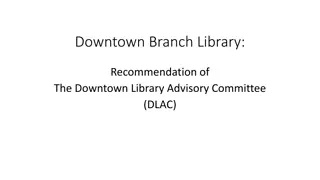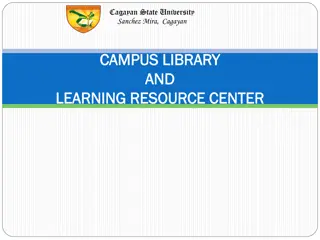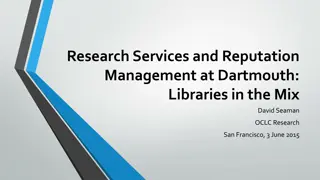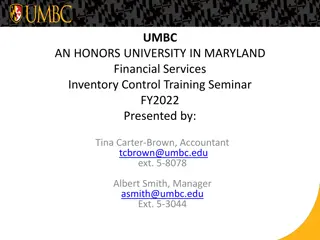Enhancing Research Appointment Services at UMBC Library
UMBC subject librarians implemented a feedback survey to improve research appointment services. By analyzing feedback data, shared best practices were developed to ensure quality and consistency. The project timeline included identifying goals, drafting the timeline, creating the feedback form, and finalizing best practices. The implementation process involved setting up the feedback form in LibCal and creating follow-up emails for patrons. Key feedback form questions focused on scheduling the appointment, understanding research needs, service improvement suggestions, and overall satisfaction with the service.
Download Presentation

Please find below an Image/Link to download the presentation.
The content on the website is provided AS IS for your information and personal use only. It may not be sold, licensed, or shared on other websites without obtaining consent from the author. Download presentation by click this link. If you encounter any issues during the download, it is possible that the publisher has removed the file from their server.
E N D
Presentation Transcript
Using the Magic of LibWizard(ry) to Create Research Appointment Best Practices University of Maryland, Baltimore County Albin O. Kuhn Library & Gallery Katy Sullivan sullivan@umbc.edu Semhar Yohannes semhar@umbc.edu
Introduction & Goals Project Introduction UMBC subject librarians created and deployed a feedback survey for all patrons who use the research appointment service. This feedback was analyzed and then helped to inform the development of shared best practices. Guided discussions around the best practices are planned. Why? It was recognized that these private interactions between a subject librarian and patron are often done in a vacuum, with no shared understanding of how to best conduct them. Goals Have a better understanding of patrons behaviors and needs regarding research appointments Inform the development of shared best practices to ensure quality and consistency Have ongoing discussions about this vital research support service Develop better ways to market the research appointment service
Timeline Phase I (mid) Jan 2019 - Identified project goals, drafted project timeline, created feedback form and integrated form into LibCal scheduling software. Feedback form ran through the spring semester. Phase II (early) May 2019 - Reviewed feedback form responses, identified major themes, and created and shared summary report. (mid) May 2019 - Sent feedback form to ALL patrons who made appointments, regardless of how they scheduled their research appointments (online, email, in-person). (early) Aug 2019 - Wrote a first draft of best practices based on analysis of the feedback form data. Revised best practices based on departmental review and discussion. With additional departmental feedback, revised the feedback form, as well. (end) Aug 2019 - The feedback form continues to be sent to patrons. Best practices were finalized and shared with the department.
Implementing the Feedback Form Setting Up the Research Appointment Feedback Survey in LibCal Setting Up the Follow-up Email to Patrons In the Follow-up Email to Patron field, replace default text in Body with: Sign into LibCal > Click Appointments > Click My Settings > Appointment Settings > select Patron Follow Up Email > 1 hour after appointment > Click Save
Feedback Form Questions 1. How did you know to schedule a research appointment? The questions in the revised feedback form focused more on what happened during the appointment, rather than how it came about. 2. Why did you schedule this research appointment? Question 6 helped identify what patrons found most valuable about the research appointment, while simultaneously guiding the design of best practices. 3. Was this appointment to support a particular course or department? 4. Do you feel you have a better understanding of your research needs and/or the library s resources? 5. How likely are you to use and/or recommend this service again? 6. What did you find most helpful about this research appointment? 7. How can we improve this service? Additional questions/comments.
Research Appointment Best Practices During Appointment Before the Appointment Begin with open-ended questions to assess needs, experience, and comfort level Prepare differently for virtual or in-person meeting Provide an opportunity for brainstorming Send a reminder email to the patron (when not automated) Be mindful of tone and responsiveness. Modify delivery, as needed. Check in regularly for understanding Finishing the Appointment Ensure patron has the tools to work independently Share information about getting additional help Provide guidance on note taking and saving/capturing content Send feedback form (when not automated) Be mindful of time and give a 5-minute notice before completion
Next Steps Conduct frequent reviews of new data from the feedback form Have regular discussions at departmental meetings about the feedback and best practices Greater exploration of best practices for research appointments in an online environment Pre-COVID: 99% in person During COVID: 100% online > Equity issues (internet infrastructure, device access, etc.) > Trauma-informed pedagogy Look more carefully at feedback to determine better ways to market the service, now that most students are living off campus Role play (or practice) with student employees and new librarians
